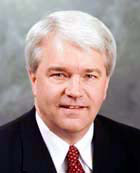“There is no relationship between trust in government and congressional election outcomes,” suggests Steven S. Smith, PhD, the author of seven books on congressional politics, including “Party Influence in Congress” and “Politics or Principle: Filibustering in the United States Senate.”
America’s satisfaction with government is hovering at all time lows according to recent polls by Gallup and the Pew Research Center.

Steve Smith
Smith, the Kate M. Gregg Distinguished Professor of Social Sciences in Arts & Sciences and director of the university’s Weidenbaum Center on the Economy, Government, and Public Policy, points out that congressional job approval ratings seldom reach 50 percent.
And, as he notes in a recent New York Times blog, midterm elections tend to reflect public sentiment about the president and his party more than Congress as a whole.
“On the face of it, congressional Democrats seem doomed by the numbers, but such ratings cannot be viewed in isolation,” Smith argues. “Congressional and presidential approval numbers usually move in tandem.”
For instance, President Obama’s approval fell about 15 points from the low 60s to high 40s in his first year, while Congress’s numbers fell from the 30s to the mid-teens, Smith notes.
Government gets poor ratings in recent polls
A Pew Research Center survey released April 18 finds that by every conceivable measure Americans are less positive and more critical of government these days.
Pew described the findings as indicative of a “perfect storm” of conditions associated with distrust of government – a dismal economy, an unhappy public, bitter partisan-based backlash and epic discontent with Congress and elected officials.
And a Gallup poll release April 16 found that registered voters are about evenly divided over whether President Barack Obama is deserving of a second term in office, with independent voters now leaning somewhat against a second Obama term.
Smith attributes the drop in Congressional approval in recent months mainly to shifting sentiments among Democrats and liberals. Democrats are frustrated with a Senate that has had difficulty acting on the party’s agenda of health care, financial services reform and climate change legislation. However, with a little help from the economy and a stronger legislative record, Democrats should be able to limit their losses in the fall to fewer than 20 House seats and two or three Senate seats, he predicts.
The recent Gallup actually found a slight overall uptick in public satisfaction with government, but Smith still sees a several trends in recent polls findings that should raise serious concerns for Democratic candidates,
“The low levels of satisfaction with government among independents is a serious problem for the Democrats,” Smith says. “The Gallup finds that independents are slightly more satisfied with government than they were a few months ago, but they remain Democrats’ most serious worry.”